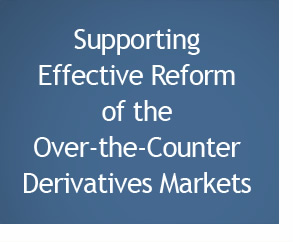08/09/10 - Analyst Wire - Deidre Bolton
|
|
Gary Dewaal, General Counsel at Newedge Group-Paris, Talks About The Effects of
Financial Regulatory Reform on Business on Bloomberg TV
DEIRDRE BOLTON, REPORTER, BLOOMBERG NEWS: Later today, some big names in the derivatives industry will be talking about the effect of the new financial reforms on their business. The Futures Industry Association is hosting an event here in New York.
One of those taking part is our next guest, Gary DeWaal. He is the Group General Counsel for Newedge Group. Gary, so glad you could come in. What does it mean, if anything, to the marketplace? We heard Goldman Sachs perhaps considering spinning off its prop unit. We have to assume there is a lot of other banks considering the same thing. What does it mean, if anything, to the marketplace if this happens.
GARY DEWAAL, GENERAL COUNSEL, NEWEDGE GROUP-PARIS: Well, Deirdre, it is really a game changer. I mean that is the most amazing thing about this whole thing.
What has happened is you have had all these products that are being traded in banks. They have been trading off exchange for years. And now, for the first time, this stuff is going to be traded on exchange just like normal exchange traded derivatives. It is going to change the way people do the business fundamentally.
BOLTON: Now Newedge is just one of the companies that is poised to benefit from these changes, right? I mean, we need transparency and we need clearing. Those are just two of the things that people can increase when they work with Newedge or any of your competitors.
DEWAAL: Well, I sure hope so. I mean, I think we've got the right model. That is the theory of our shareholders, Soci,t, G,n,rale and Cr,dit Agricole. We are one of the largest exchange traded brokers in the world. We tend to dance month to month according to the CFTC in exchange traded funds No. 1 and No. 2.
So we think this is great for us, and we actually do think it is great for the industry in general. As I said, as you said, it increases transparency. It brings a central counter party to the process. And it should reduce systemic risk.
BOLTON: I mean insured broker dealers should also do pretty well as a result of regulation, right? I mean ICAP and Jefferies -
DEWAAL: Correct.
BOLTON: there is a whole list that's -
DEWAAL: Yes, I mean the beneficiaries are going to be the exchanges for sure - the Chicago Mercantile Exchange, ICE, it's going to benefit the inter-dealer brokers. And it is going to affect the pure brokers like us and one of our competitors, MF Global.
BOLTON: So bigger picture, I mean, it shows that the middle man is making a come back, right, because -
DEWAAL: On this one -
BOLTON: - for years the idea was basically to cut out the broker when possible.
DEWAAL: Sure, on this one, that is the whole idea. The idea is that there is an intermediary and through the intermediary there will be transparency.
BOLTON: So, transparency obviously the clearing house, now your clients, as you mentioned, financial companies - I mean asset managers, hedge funds. You have a pretty long list. Are you seeing more business these days? We have to assume that is a big yes. But can you quantify it all versus, for example, a year ago?
DEWAAL: Well, I'll give you a surprising fact. In fact, this kind of business has been trading now on exchange - I'm sorry, through central clearing parties since May of 2002, when the New York Mercantile Exchange introduced the ClearPort system. So it is really nothing new. It is just an evolution into financial products.
BOLTON: What do you think is going to be the biggest boon as you see it? I mean what products are you seeing the highest increase in frequency?
DEWAAL: Well, I think what you will see is the interest rate swaps, - and, again, you bring up a very good point, the legislation really won't be effective for about one year. There is a lot of rule making that has to happen.
But, in fact, the products already started to trade. There is the ICDG, which is one of these clearing houses that are going to offer this product; CMB, through an ARIS Platform is beginning interest rate swaps. You will see the product trading long before the legislation is implemented through rule making of the SEC and the CFDC.
BOLTON: Gary, you alluded to your owners, two French banks. I mean, we've talked a lot in the U.S. about the more stringent that regulation becomes here, more business goes overseas. And that was one of the biggest arguments for letting the system continue as it was. Is there any business that you see being able to be repatriated that perhaps not could have had that chance before?
DEWAAL: I do, Deirdre. In the legislation, there is buried something which really has nothing to do with derivatives - OTC derivatives. It is called portfolio margining. And this is the process through which you basically or through clients get a benefit for offsetting assets.
Right now you can do that kind of trading in the U.K. Clients can get the benefits of offsetting margin. Here in the United States, they can't today. Now the legislation has been enacted, it will give the SEC and the CFTC the impetus to get this rule making done to help bring some business from the U.K. back to the United States.
BOLTON: Do you see any other larger businesses that are likely to come back? And I mean how much is worth, Gary, in dollar amounts?
DEWAAL: Well, we see - I mean, frankly we see it worth billions of dollars just for our own enterprise. But one of the great advantages is that overall a lot of people say that this might hurt liquidity. That's what you will hear a lot of the dealers saying. In fact, we think the exact opposite will happen.
We think that because there is exchange trading, you will see new players in the market. Groups called professional trading groups, right now the dealers are the only ones who typically make markets in the derivatives. We see the professional trading groups doing that also.
We see them doing it on U.S. exchanges. We see them providing more attraction to trading this product. We see what is now a buy and hold product becoming a traded product, and that is going to be good ultimately for hedgers and real - other people, who really need to get in and out of the markets easily.
BOLTON: So essentially you are saying water - sort of like water, or money is like water. You put the stone there it is still going to flow, it is just going to flow in a different direction.
DEWAAL: I think the velocity could increase.
BOLTON: All right, Gary, thank you so much. Gary DeWaal joining us there. He is Group General Counsel at Newedge Group, joining us there ahead of that industry association - the Futures Industry Association. There is going to be a conference later today talking about the potential changes to the industry based on reg reform. |



